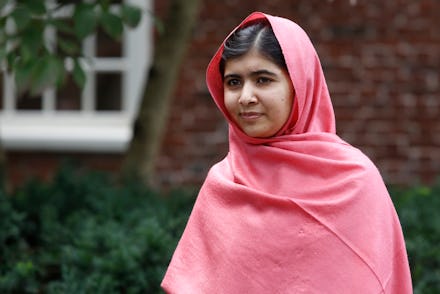10 Ways Malala Yousafzai Has Changed the World

Update: On Friday, October 10, Malala Yousafzai became the youngest Nobel Peace Prize winner in history when was awarded the 2014 prize along with Indian children's right activist Kailash Satyarthi. Yousafzai, 17, and Satyarthi, 60, were chosen "for their struggle against the oppression of children and young people, and for the right of all children to education," the Norwegian Nobel Committee said.
In October 2012, the world watched as the Taliban shot a 15-year old girl named Malala Yousafzai on her way to school. The United Nations declared Friday, July 12 Malala Day in honor of this inspirational young girl and her 16th birthday. She celebrated the day by making her first public appearance and delivering a speech to the UN Youth Assembly, which only emphasized the many ways that she has changed the world at such a young age.
1. She has sparked a dialogue about children's education throughout the world
There are currently 57 million children who have no access to education. Vuk Jeremic, the president of the General Assembly of the United Nations, stated, "Today we stand united with young people from nearly one hundred countries in seeking to ensure that no child is barred from attending school — convinced that factors like geography, gender, disability, language, wealth, and ethnicity, should not be seen as impediments to this achievement," in response to Malala's moving speech.
2. Three million people have signed the Malala Petition
At such a young age, she has managed to encourage people to stand together behind a common cause. The Malala Petition (which Malala was the first to sign) urges the United Nations to recommit to Millennium Development Goal 2, which involves universal primary education for children around the world.
3. Her ability to be fearless is inspiring beyond measure
When she was 11 years old, Malala wrote a diary under the pseudonym Gul Makai in which she discussed life (specifically education) under the Taliban. This diary was published by BBC Urdu. If her identity was ever revealed it was obvious that she would suffer grave consequences. Yet she continued to write and educate other individuals about the conditions in Pakistan. Through her writings, her subsequent shooting, and her inspiring speech at the UN, she has showed us all that we should never give up on a cause we believe in.
4. She has created the Malala Fund
The Malala Fund, which will officially launch this fall, has been established in order to ensure that beyond the words of her speech, tangible results are reached in the fight for access to education.
5. She has taught us all about forgiveness
One of the most moving moments of her speech was when she said, "I do not even hate the Talib who shot me. Even if there is a gun in my hand and he stands in front of me. I would not shoot him."
6. She has shown us that there is no age limit to stand up against injustice
Malala has been sharing her diaries with BBC since she was 11 and celebrated her 16th birthday speaking at the UN about a cause she believes in. Because of her remarkable story, in February 2013 she was the youngest individual to ever be nominated for a Nobel Peace Prize.
7. Her story has reminded children throughout the world not to take anything for granted
So many children take the simple action of going to school for granted on a daily basis. Malala's story and her fight to attend school has reminded everyone, children and adults alike, to not take anything for granted in our lives.
8. She has challenged us all to wage a war...
...against illiteracy and terrorism by "picking up our books and pens."
9. She has illustrated the importance of peaceful conflict resolution
Inspired by leaders such as Mahatma Gandhi, Malala has resorted to peaceful solutions in order to tackle the issues of girls' education and the equality of women.
10. She has caused the UN to recommit to Millennium Development Goal 2
This goal states that "by 2015, children everywhere, boys and girls alike, will be able to complete a full course of primary schooling." After Malala delivered her speech, United Nations Secretary General Ban Ki Moon stated that the UN is committed to providing education to all children through its Global Education First Initiative.